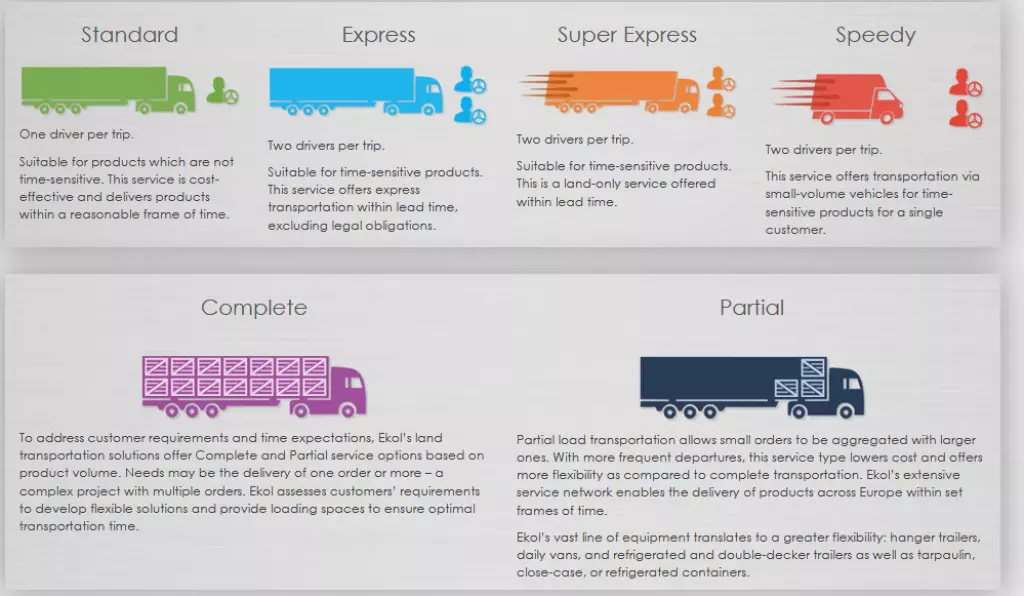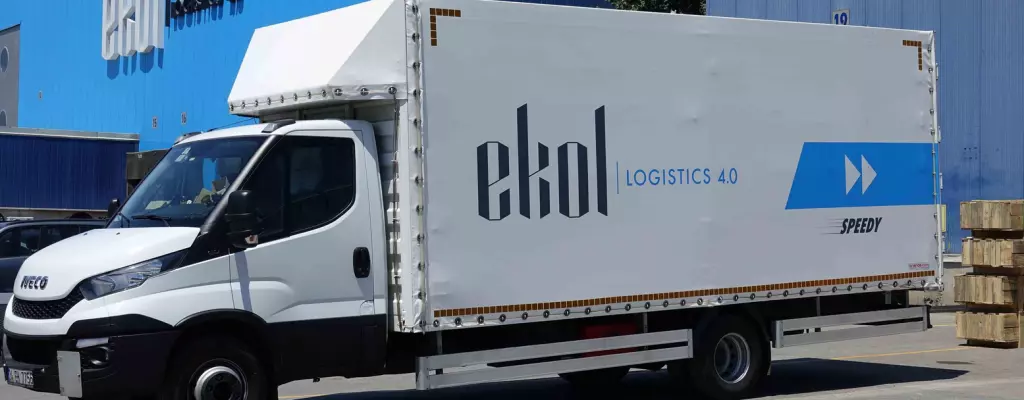Road Freight





- Rating
-
- Business
- Ekol Lojistik
- Category
- Logistics Companies > Logistics and Transportation
- Price
- price not defined
- Minimum Order
- 1
- Maximum Order
- 1000000
- Unit
- Frieght
- Countries sellable to
- Afghanistan, Aland Islands and 248 more
Share on
Ekol’s robust infrastructure addresses the transportation requirements of various types of products including medicine, textiles, inflammable and toxic chemicals, food and cold chain products, heavy industry products, and high-tech electronics.
Ekol offers four types of services according to transit time: Standard, Express, Super Express, and Speedy.
Freight Models
Taking into account the criteria such as transit time, tonnage, and product characteristics, Ekol offers land, cold chain, Ro-Ro, and intermodal transportation solutions. Ekol’s tailor-made solutions come at flexible prices thanks to an extensive and eco-friendly fleet of tow trucks which meet EURO 5 and EURO 6 standards.
Our flexible, time-saving route planning and smart solutions guarantee top service standards, efficiency, and quality.
Road
Road freight is a lean model; products are transported to Ekol transfer centers and then to the targeted points, all by road.
This method also makes it possible to collect and consolidate products at transfer centers and deliver them to the desired destinations in line with import – export procedures.
Ro-Ro – Road
This type of transport involves two different modes of transports – sea and land. To this effect, it is suitable for high-tonnage products due to the fact that the tonnage holds restrictions on European highways. Products are transferred from European and Turkish ports by Ro-Ro and next switched to land transportation for final delivery.
This model allows products to be transported by land to the ports of Trieste, Sète, Haydarpaşa, Lavrio and Alsancak, and later consolidated and delivered to their final destination by the Ro-Ro in line with import – export procedures.
Intermodal
The intermodal model utilizes three modes of transport: sea, railway, and road. Products are transported by Ro-Ro from their respective ports to Trieste and Sète ports. Next, they are transferred to rail: from Trieste to Ludwigshafen, Ostrava or Cologne, and from Sète to Paris. From there they are carried by road to their final destinations.
Likewise, products transported by railway to Cologne, Ostrava, Ludwigshafen, or Paris are consolidated and shipped by rail to the ports of Trieste and Sète. Finally, they are shipped to their respective ports by Ro-Ro.
Intermodal transportation reduces fuel consumption as well as carbon, particle, and nitrogen oxide emissions. Thanks to green logistics, 365,000 trees are saved each month.
Ekol offers four types of services according to transit time: Standard, Express, Super Express, and Speedy.
Freight Models
Taking into account the criteria such as transit time, tonnage, and product characteristics, Ekol offers land, cold chain, Ro-Ro, and intermodal transportation solutions. Ekol’s tailor-made solutions come at flexible prices thanks to an extensive and eco-friendly fleet of tow trucks which meet EURO 5 and EURO 6 standards.
Our flexible, time-saving route planning and smart solutions guarantee top service standards, efficiency, and quality.
Road
Road freight is a lean model; products are transported to Ekol transfer centers and then to the targeted points, all by road.
This method also makes it possible to collect and consolidate products at transfer centers and deliver them to the desired destinations in line with import – export procedures.
Ro-Ro – Road
This type of transport involves two different modes of transports – sea and land. To this effect, it is suitable for high-tonnage products due to the fact that the tonnage holds restrictions on European highways. Products are transferred from European and Turkish ports by Ro-Ro and next switched to land transportation for final delivery.
This model allows products to be transported by land to the ports of Trieste, Sète, Haydarpaşa, Lavrio and Alsancak, and later consolidated and delivered to their final destination by the Ro-Ro in line with import – export procedures.
Intermodal
The intermodal model utilizes three modes of transport: sea, railway, and road. Products are transported by Ro-Ro from their respective ports to Trieste and Sète ports. Next, they are transferred to rail: from Trieste to Ludwigshafen, Ostrava or Cologne, and from Sète to Paris. From there they are carried by road to their final destinations.
Likewise, products transported by railway to Cologne, Ostrava, Ludwigshafen, or Paris are consolidated and shipped by rail to the ports of Trieste and Sète. Finally, they are shipped to their respective ports by Ro-Ro.
Intermodal transportation reduces fuel consumption as well as carbon, particle, and nitrogen oxide emissions. Thanks to green logistics, 365,000 trees are saved each month.